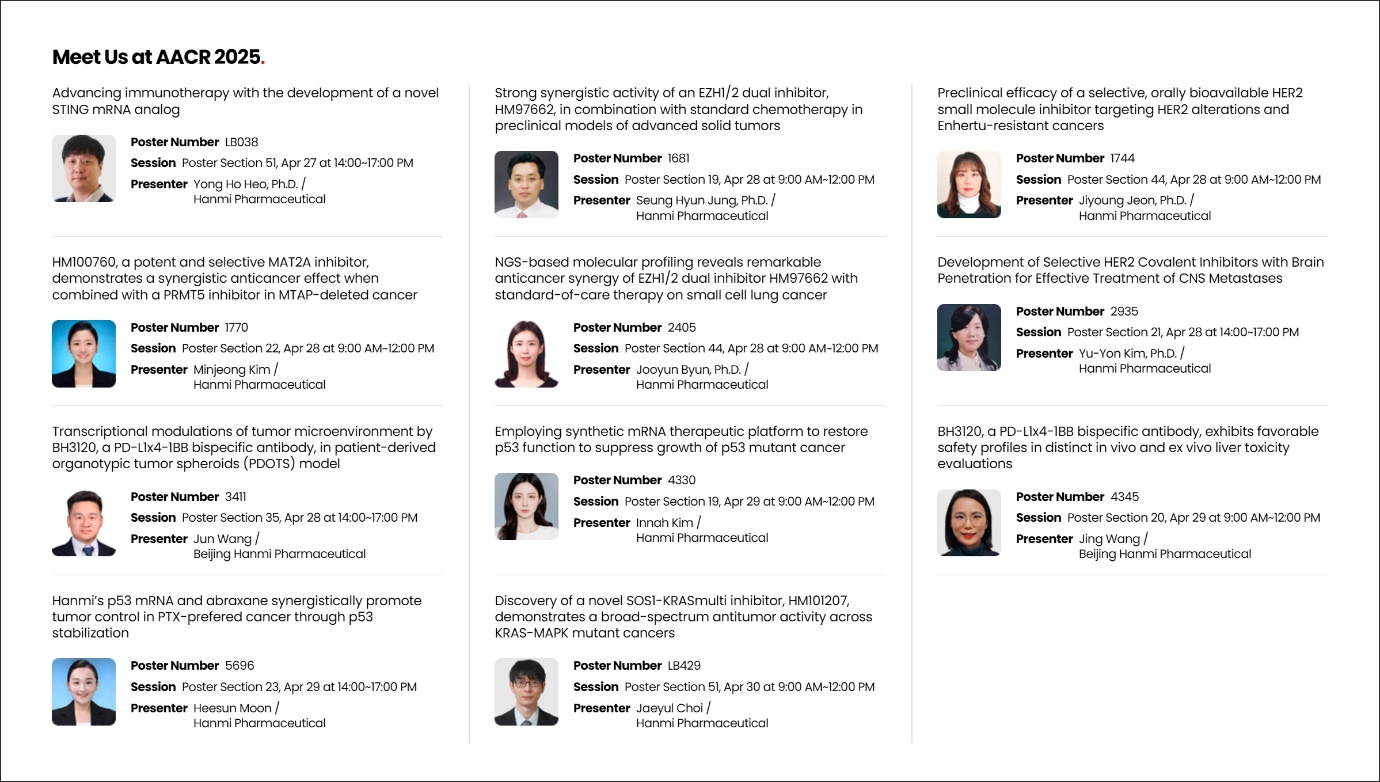Hanmi Expands Oncology R&D Presence with Most Abstracts from Korea at AACR 2025
Hanmi Expands Oncology R&D Presence with Most Abstracts from Korea at AACR 2025
Hanmi to Present 11 Research Abstracts on 7 Novel Oncology Assets at AACR 2025
Steady Pipeline Expansion: 7 Abstracts in 2023, 10 in 2024, and 11 in 2025
Debut of New Pipelines Including STING mRNA Anti-tumor Immune Response and SOS1-KRAS Multi Inhibitor HM101207

An overview of Hanmi’s poster abstracts featured at AACR 2025 is available on the company’s website.
Hanmi Pharmaceutical is once again demonstrating the strength of its oncology pipeline by unveiling the highest number of research abstracts among Korean pharmaceutical companies for the recent three years at the American Association for Cancer Research (AACR) Annual Meeting.
Hanmi announced that it will present 11 research abstracts on 7 novel oncology candidates at AACR 2025, to be held in Chicago, USA, from April 25 to 30. The presentations span a range of innovative therapeutic modalities and reinforce Hanmi’s momentum in expanding its oncology R&D footprint―growing from 7 presentations in 2023 to 10 in 2024 and 11 this year.
The research includes two studies each on Hanmi’s EZH1/2 dual inhibitor (HM97662) and selective HER2 inhibitor (HM100714), as well as projects on a selective MAT2A inhibitor (HM100760), SOS1-KRAS multi-inhibitor (HM101207), STING mRNA-based analog, and p53-mRNA anti-cancer therapy. Two additional studies will feature BH3120, a bispecific antibody developed by Beijing Hanmi using the company’s proprietary bispecific antibody platform technology, "Pentambody."
Poster presentations will be delivered by Hanmi researchers, who will also introduce the company’s innovative projects, providing opportunities for meaningful collaboration with leading global pharmaceutical companies.
Developing Precision Therapies Targeting Specific Oncogenic Mutations
Hanmi will present a new biomarker for the next-generation EZH1/2 dual inhibitor (HM97662), which significantly enhances anticancer efficacy when combined with standard chemotherapy. While platinum-based or chemotherapy agents, including irinotecan, remain standard treatments for various solid cancers such as ovarian, bladder, and small cell lung cancer, these approaches face challenges due to recurrence and the development of resistance.
The company will also present new findings on HM100714, a selective HER2 covalent inhibitor currently in development as an oral treatment for HER2-altered cancers. At this year’s AACR meeting, results will be shared regarding HM100714’s potential to overcome resistance to Enhertu, as well as its efficacy in treating central nervous system (CNS) metastases associated with HER2 alterations. HER2 alterations are known to increase the risk of brain metastases and leptomeningeal spread in cancers such as breast and lung, contributing to poor prognosis and reduced survival.
Following its initial reveal in October of last year, Hanmi’s MAT2A inhibitor (HM100760) will now be presented with additional data demonstrating synergistic efficacy when combined with a PRMT5 inhibitor. By targeting the metabolic vulnerabilities of cancer cells, this approach is gaining attention as a potential breakthrough for intractable cancers.
Hanmi will also unveil, for the first time, the mechanism and preclinical results of HM101207, a novel SOS1-KRAS multi-inhibitor. This candidate works by blocking the interaction between the SOS1 protein and KRAS―a notorious oncogenic driver―thereby preventing KRAS activation and downstream signaling in KRAS-mutant cancers.
Dr. In Young Choi, Head of Hanmi R&D Center, commented, “Our oncology researchers are deepening their work in precision medicine to define the next wave of targeted cancer treatments. By focusing on key oncogenic functions such as EZH1/2, HER2, MAT2A, and SOS1, we are advancing a portfolio of highly selective therapies that aim to transform cancer care through molecular precision.”
Expanding Innovation: mRNA Platform as a Promising Next-Generation Modality
Hanmi is also expanding its mRNA platform as a next-generation modality in oncology, with the debut of a new program at this year’s AACR which is an mRNA-based therapy designed to express the STING (Stimulator of Interferon Genes) protein within tumors, thereby triggering a robust antitumor immune response. STING activation is known to enhance the infiltration of immune cells into tumors and amplify anti-tumor immune response―making it a promising strategy for immunotherapy.
In addition, Hanmi will share results from its p53-mRNA program, which targets cancers with p53 mutations. Mutations in the tumor suppressor p53 occur in a majority of cancers and drive unchecked cell division and growth. While therapies targeting p53 mutations have long been considered a "holy grail" in oncology, no approved treatments currently exist―underscoring the significance of Hanmi’s research.
Beijing Hanmi Pharmaceutical, a subsidiary of Hanmi Group, will present preclinical findings on BH3120, a bispecific antibody immunotherapy now in Phase 1 clinical trials in both Korea and the U.S. The Beijing R&D team is conducting additional nonclinical studies in parallel with clinical development to better elucidate the compound’s in vivo mechanisms of action.
“As a leading R&D-driven pharmaceutical company in Korea, we are showcasing a diverse and innovative oncology pipeline built on rigorous science and cutting-edge modalities,” said Dr. Choi. “Hanmi continues to shape the future of biopharmaceutical innovation by advancing first-in-class programs and redefining the value of Korean R&D on the global stage.”
■ Contact info:
Official Websites: www.hanmipharm.com
innovation@hanmi.co.kr, +08-2-410-0467